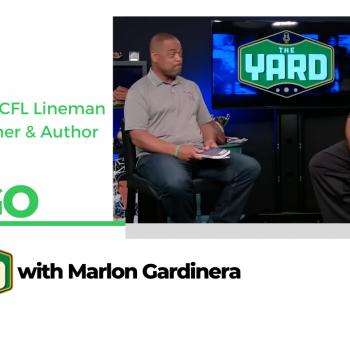
 Jesus in HD 189: Blessed Assurance, Jesus is Mine (and ALWAYS will be!) Play Now | Play in Popup | Download
Jesus in HD 189: Blessed Assurance, Jesus is Mine (and ALWAYS will be!) Play Now | Play in Popup | DownloadGet yourself ready for a massive dose of encouragement.
As you are about to hear in this PODCAST, it’s amazing to me how a couple of significant storylines are coming full circle with Jesus’ words in John 15.
Specifically, last week we saw how Jesus’ assertion, “I am the vine,” is the final of Jesus’ seven “I Am” statements recorded in the Gospel of John.
Now, for this discussion, here’s a Bible Trivia Question for you:
What was the very first parable that Jesus taught as recorded in the Gospels?
I’ll give you a couple of hints:
- It’s found in Mark Chapter 2.
- It’s a parable about a new day coming, the Messianic Age dawning, a day that began in Bethlehem, a day filled with bright hopes and blazing anticipation.
A part of that first parable goes like this:
Jesus said, “No one puts new wine into old wineskins; or else the new wine bursts the wineskins, the wine is spilled, and the wineskins are ruined. But new wine must be put into new wineskins.” (Mark 2:22)
New wine, symbolic of a new day, a great day, a beautiful day, a day of God’s bountiful blessing. A day of God’s abundant blessings of which you, and all of God’s people, are now the recipients.
How appropriate then that Jesus’ teaching ministry was bookended by two parables, both of which centering upon that singular Scriptural image: the fruit of the vine.
That first parable coming, in Mark 2, at the very beginning of Jesus’ ministry. This final parable, here in John 15, that Jesus began with the word, “I am the vine, you are the branches.”
As you are about to hear, that metaphor, the fruit of the vine, was not chosen arbitrarily. It is loaded with copious amounts of Scriptural significance that speaks directly to your life today.
Now, immediately following Jesus’ and His Disciples’ final Passover meal together – which featured four separate cups of wine, by the way – Jesus told them this parable centered around the enduring cultural symbol of God’s abiding love and blessing.
“I am the true vine, and My Father is the vinedresser. (John 15:1)
Jesus is the TRUE VINE: the fulfillment of every Old Testament reference to a vine that you will find… the perfect, ultimate vine. And, as a blessing, He told His Disciples (and us) that they/we are the vine’s branches.
Now, in His very first parable (Mark 2:22), Jesus signaled that a new day filled with God’s bountiful blessing was coming. Then, in His very last parable (John 15:1-17), Jesus is signaling to His Disciples that this new day had come because of the crucifixion that would happen the next morning.
It had come full circle.
Jesus’ purpose in telling His final parable was to assure His Disciples – and us – of His continual love, tender care, and bountiful blessing. It is a parable of blessed assurance!
Yet, sadly, this point is missed all to often.
It’s often missed because of the twist that Jesus throws in in verse two:
Every branch in Me that does not bear fruit He takes away;

What does this mean? He’s talking about branches, so those must be believers. So, are these believers who lose their salvation, thus being cut off? Or maybe they were never believers at all… but, He doesn’t describe people who “claim to be branches” or “think that they are branches”. He describes branches. Branches that are “in Him”, no less.
Here’s something that you have to dig deeper to grasp: The original word that Jesus used to describe the fate of the non-fruit-bearing-branches does mean “to take away”. However, equally so, it means “to lift up, from the ground, by hand”.
“Jesus’ hearers would have understood this as an illustration of the close, nourishing relationship that Jesus desired between Himself and His followers.” – Dr. James Fleming
This is not a parable about eternal destiny. It’s not a metaphor regarding who is saved and who is lost. It doesn’t threaten judgment, nor does it preach salvation.
At this moment, Jesus was huddled with His disciples. This is a parable to committed Christ-followers regarding how they, and we, can spiritually thrive in a hostile environment!
Further on in Jesus’ parable, He lays out this metaphor:
If you do not remain in me, you are like a branch that is thrown away and withers (John 15:6)
Did you catch that? Jesus uses a simile – you are LIKE a branch. Not you ARE a branch that is thrown away.
So… having nothing to do with our eternal destination, what does this parable concern? It concerns our daily walk. It has everything to do with our lives – here and now.
His message was this: When the going gets tough – and it will get tough – don’t stumble. Don’t give up. Don’t quit. But, even if you do stumble or quit, He will lift you back up, by hand. He wants us to stay true to our commitment to Him, bearing fruit, and He will always stay true to His commitment to us.
He who abides in Me, and I in him, bears much fruit; for without Me you can do nothing. (John 15:5)
THAT is the point of Jesus’ parable. Without Him, we can’t do anything.
Just like He did to Peter after he stumbled, denied Jesus, quit discipling, and went back to fishing… thinking he was all alone after Jesus had died… Jesus lifted Peter up, by hand, and reinstated Him as the Church leader he was destined to be.
You see, the purpose of a parable is to illustrate one central point. And, Jesus usually tells us what that point is throughout the Gospels.
Here, His point is that, just like branches, our spiritual survival in this world is dependent on our connection to the vine. As a loving and tender vinegrower, God the Father fills our lives with the Holy Spirit. God will lovingly and tenderly prune every branch (that’s each of us) with the purpose of producing within us a spiritual vitality so that we can thrive. The pruning is painful. But, it is necessary as He cuts out of our lives anything that might get in the way of our growth or our ability to bear fruit.
Which fruit?
the Holy Spirit produces this kind of fruit in our lives: love, joy, peace, patience, kindness, goodness, faithfulness, 23 gentleness, and self-control. (Galatians 5:22-23)
Not stuff you do, but stuff that defines who you are… qualities that shine out of you to the world. They are qualities that grow and mature as you abide in Jesus and mature.
On the flipside, as Jesus talks about a withering and burning, He isn’t talking about hellfire, but a useless and fruitless existence.
As Jesus said, living without Jesus in us, helping us to bear His fruit is like being salt that has lost its flavor or a light hiding under a bushel.
This is why Jesus implores us to abide in Him, connected to Him as a branch is to the vine…
“I am the true vine, and my Father is the gardener. 2 He cuts off every branch in me that bears no fruit, while every branch that does bear fruit he prunes so that it will be even more fruitful. 3 You are already clean because of the word I have spoken to you. 4 Remain in me, as I also remain in you. No branch can bear fruit by itself; it must remain in the vine. Neither can you bear fruit unless you remain in me.
5 “I am the vine; you are the branches. If you remain in me and I in you, you will bear much fruit; apart from me you can do nothing. 6 If you do not remain in me, you are like a branch that is thrown away and withers; such branches are picked up, thrown into the fire and burned. 7 If you remain in me and my words remain in you, ask whatever you wish, and it will be done for you. 8 This is to my Father’s glory, that you bear much fruit, showing yourselves to be my disciples.
9 “As the Father has loved me, so have I loved you. Now remain in my love. 10 If you keep my commands, you will remain in my love, just as I have kept my Father’s commands and remain in his love. 11 I have told you this so that my joy may be in you and that your joy may be complete. 12 My command is this: Love each other as I have loved you. 13 Greater love has no one than this: to lay down one’s life for one’s friends. (John 15:1-13)
But, how are we supposed to abide/remain in Him? What does that look like? Just by fellowshipping with His people, studying His word, worshipping Him, obediently giving to Him… you are already abiding and remaining.
Don’t stop. Don’t stumble. Don’t quit.
And if you do, allow Him to tenderly lift you up.
















